This “Limited Edition” Blu-ray from Arrow Video is currently available for purchase.
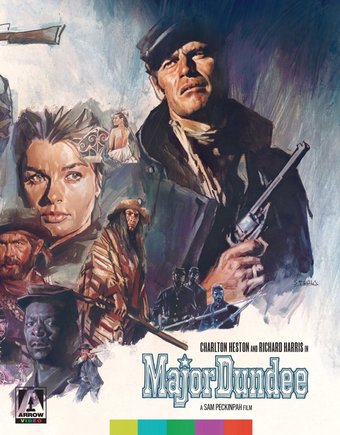
Few careers in the film business are as wild and storied as that of Sam Peckinpah. He began as a TV writer on shows like Gunsmoke and The Rifleman before venturing out to work directing several film classics. Known for his extremely difficult (and self-destructive) personality, this figure still managed to revolutionize the cinema by focusing on antiheroes and presenting a far grittier and bloodier world than had ever been seen to this point in American cinema. His stunning catalog includes titles like Ride the High Country, The Wild Bunch, Straw Dogs, Junior Bonner, The Getaway, Pat Garrettt & Billy the Kid and Cross of Iron among many others. Naturally, these features had disturbing themes, which still push buttons and generate debate among critics to this day.
Arrow Video are now releasing an impressive 2-Disc “Limited Edition” Blu-ray of an early picture from the filmmaker’s catalog. Major Dundee marked Peckinpah’s first A-list Hollywood production, boasting big studio backing and a phenomenal cast. As you might have guessed based on the Peckinpah’s notorious reputation, things didn’t go particularly smoothly. The shoot was described as chaotic (which would become the norm with most of the filmmaker’s projects), the studio didn’t appreciate the director’s attempts to subvert the traditional western formula. The producer eventually took Peckinpah’s cut of 155 minutes and made edits, resulting in a shorter version that ran 136 minutes. This act caused great friction between the director and executive. However, the studio then stepped in and stripped the movie down to 123 minutes, ultimately fashioning a totally different feature out than what had been presented to them. This set includes new 2K scans of the theatrical version and extended producer’s cut of the movie.
For those unfamiliar with the movie, it is set towards the end of the Civil War. Union Cavalry officer Major Dundee (Charlton Heston) finds himself demoted for committing a tactical error during the Battle of Gettysburg. As punishment, he is sent to take command of a prison in the New Mexico Territory. After Apache war chief Sierra Charriba (Michael Pate) attacks and slaughters a nearby settlement, Dundee sees it as an opportunity to prove himself and shame the superiors responsible for his job downgrade. He decides to fashion his own military unit to catch Charriba and earn some respect. With only a scout (James Coburn) and few soldiers working on site due to the Civil War, he forces Confederate prisoner Captain Tyreen (Richard Harris) and his crew to join him. Dundee also takes a selection of criminals from the institution, as well as a number of black soldiers to assist him. Naturally, the journey is perilous as the team are forced to chase Charriba into Mexico, which is occupied by French troops.
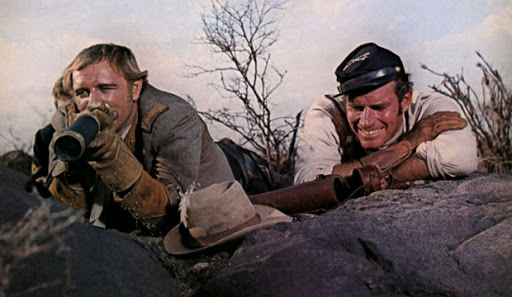
As you might have guessed, everyone on the team is at odds or hates one another, leading to tension and death threats between the various group members… that is, when they aren’t busy fighting for their lives with Charriba’s men or French troops. Dundee himself is a self-involved figure whose primary motivation is his own fame. He doesn’t appear to care about the lives of those whom he has recruited. However, things gets more morally and ethically complicated as time passes and he spends more time with individuals within the group.
It’s a great concept filled with tension and drama. Dundee is no hero and several characters are shown in shades of gray. Beyond the lead’s dubious motivations and the manner in which he uses his men, the movie even makes a point of introducing a female love interest (Senta Berger), only to have the protagonist cheat on her later in the film. While these actions may put some viewers off, it certainly makes the film and its deeply flawed characters more interesting.
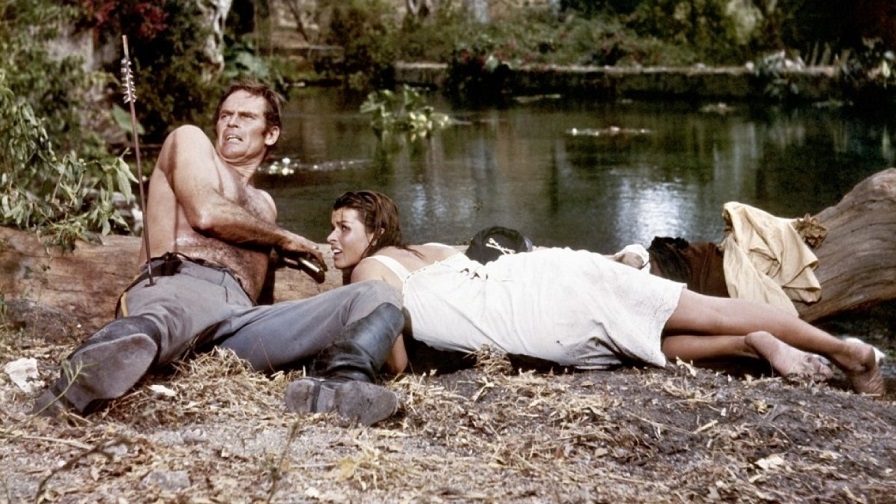
Of course, like most Peckinpah flicks the conflicts displayed are nastier and messier than in other films of the era. These clashes between enemies (and sometimes even compatriots) have an anarchic and turbulent feel, which again adds to the experience and horror of battle. And while it takes a while to introduce the numerous supporting characters, many of them do make a distinctive impression, either by appearance of by their quirky nature. The movie even features a priest (R.G. Armstrong) with a murderous streak. And for those who enjoy cinematography, there is plenty of impressive widescreen photography.
Naturally, the theatrical cut has many deficiencies. It seems that the bloody skirmishes have been cut down significantly and some important moments towards the end with supporting characters appear to be excised. In fact, the film loses track of many of the troupe members and doesn’t really wrap up their plotlines. But perhaps the biggest crime of the theatrical cut is the score and theme song. The added theme song and lyrics try to the make the main character into a hero, when he’s clearly anything but. And it’s clear that edits were made to try and make Dundee more palatable, but all they end up doing is showing even less rationale for his questionable actions.
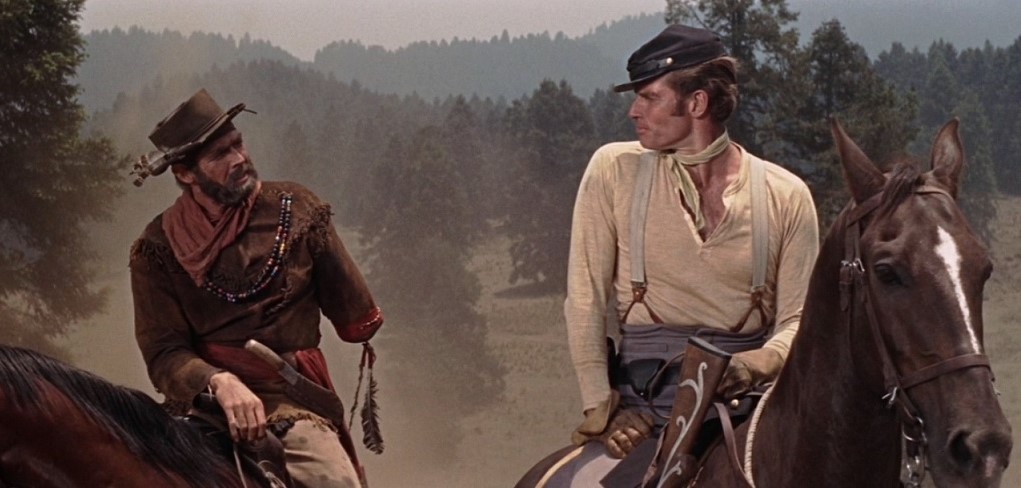
Thankfully, the extended producer’s cut (which was discovered in 2004) is much stronger. It has more scenes with the entire cast that help us understand their issues a little better. The action is a bit more graphic as well, helping to further cement the grimier and more realistic feel of the picture. Additionally, the score is far more somber and appropriate given the events being depicted. We may never see Peckinpah’s true vision of the film, but at least this is a far superior version to what played on cinema screens during the film’s original release.
As with seemingly every Arrow Video release, the image quality is great and the movie has certainly been given a fresh coat of paint. It still looks filmic, but there aren’t any blips or dirty frames here like those appearing on previous DVD and VHS copies. The outdoor location photography looks striking and helps visual elements stand out. This includes remarkable tracking shots during the climactic fight in which the camera moves across a river while several of Dundee’s men meet their as they square off against French soldiers.
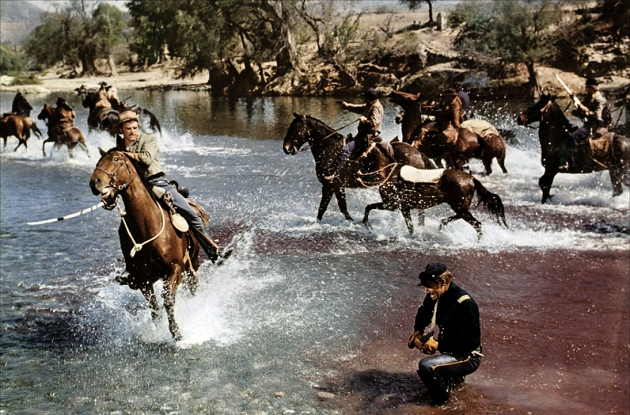
The extras featured on the Blu-rays are incredible. On the disc with the extended cut, there’s an informative visual essay that details some of the common themes that Peckinpah used and would return to in future projects. It also notes the director’s own personal demons and how they influenced his filmmaking process.
We learn more about Peckinpah’s original and currently lost 155-minute version. Apparently, there was important footage removed of the raid that sets off the events in film. Peckinpah employed a great deal of slow-motion photography during the gunfights (particularly during the finale) to emphasize particularly brutal moments and the ends of several characters. This would have been far more powerful to watch had the technique been employed. There is also reference to original ending, which was much darker and suggested that the survivors wouldn’t be relieved of their duties or promoted. Instead, they would likely be going in circles until they did eventually meet their ends. It would have made for a more powerful movie. Amusingly, a letter written by Peckinpah is shown in which he insults the producer and studio for ruining his movie.
Viewers also learn more personal details about the eccentric director. According to many who had worked with him, Peckinpah was a functioning alcoholic who veered wildly in temperament during his shoots. Interestingly enough, the critic narrating for this featurette suggests that Slivovitz was the filmmaker’s drink of choice. In case you aren’t familiar with it, that’s some powerful booze that could peel the paint off of the wall (if you really want to try it, I’d suggest taking a jigger and sloshing a bit into a glass of pineapple juice – it might not be as macho a way to ingest it, but you’ll still get a buzz and be able to wake up the next morning).
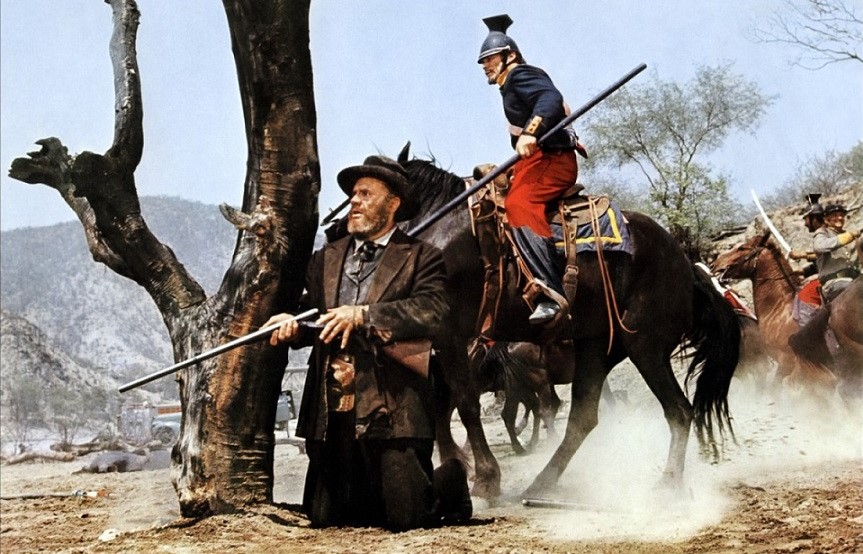
Anyway, getting back on topic, it’s a wonderful extra. There are also three film expert commentaries on the extended cut of the movie. The first features Nick Redman, David Weddle, Garner Simmons and Paul Seydor. They share their opinions on the movie and Peckinpah’s career. The group have different interpretations and thoughts about individual elements, sometimes disagreeing, but they all respect each other’s opinions and have fascinating things to say. It’s a fun and intriguing listen.The second track features historians Glenn Erikson & Alan K. Strode, while the third commentary with Erikson on his own is more of an informational.
I also highly recommend the feature-length documentary included on the disc. It’s called Passion & Poetry: The Dundee Odyssey by Mike Siegel. The moviemaker assembles interviews from various cast members including James Coburn, Senta Berger, Mario Adorf, L.Q. Jones, R.G. Armstrong and Gordon Dawson. They all share specific memories about the crazy production and memorable experiences working with Peckinpah. Some liked him more than others and some memories about specific events differ, but if even half of it is true, there are some wild revelations. In a second bonus feature, Siegel presents interview footage of nine actors who share personal stories about the director.
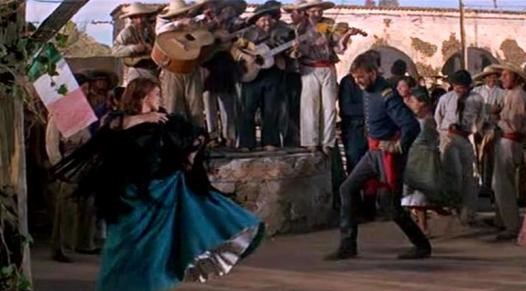
And there is also a featurette with Siegel himself that details his own story. It seems that this film enthusiast become a Peckinpah fan from an early age, collecting as much press and publicity material as he could during his early years. In the early 2000s, he set out to conduct video interviews with everyone who had ever collaborated with the filmmaker. He now has a treasure trove of some 40 plus hours of footage with many participants who are now deceased. Siegel has become an authority on Peckinpah and has created various documentaries on the figure and his films. Remarkably enough, he has many more hours of tape that has yet to see the light of day. This is because studios that own rights to some of the movies still haven’t released some of his films on Blu-ray. Naturally, all kinds of publicity materials are also available on the disc to view, which likely came from Siegel himself.
As for the theatrical edition, extras include a vintage behind-the-scenes featurettes on the flick, as well as extended/deleted scenes and outtakes. Most importantly, there are more clips with commentary from Erikson about how these cut moments would have been used in Peckinpah’s original cut. And if that wasn’t enough, there’s a poster featuring the Blu-ray cover art and gorgeous color book with more images and essays on the film and its importance.
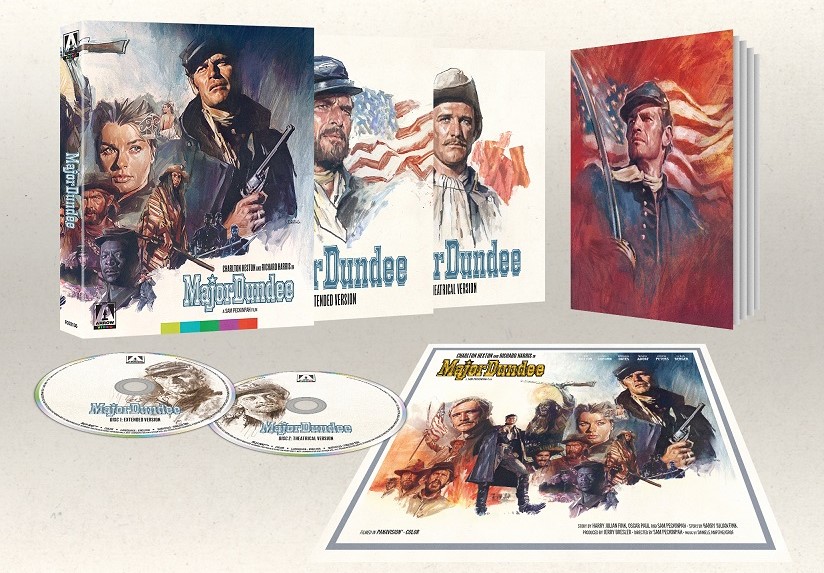
This is a phenomenal release that boasts great picture quality and two very different versions of a movie to compare and contrast. It also comes with a wealth of bonus materials that will inform any viewer and help them learn not only about the production itself, but the wild figure who brought it all to life. Not everyone out there appreciates the work of Sam Peckinpah, but he is truly a unique individual who followed the beat of his own drummer and made movies that aren’t easily forgotten. Major Dundee is a great Blu-ray for anyone who enjoys the filmmaker’s work or westerns in general.


